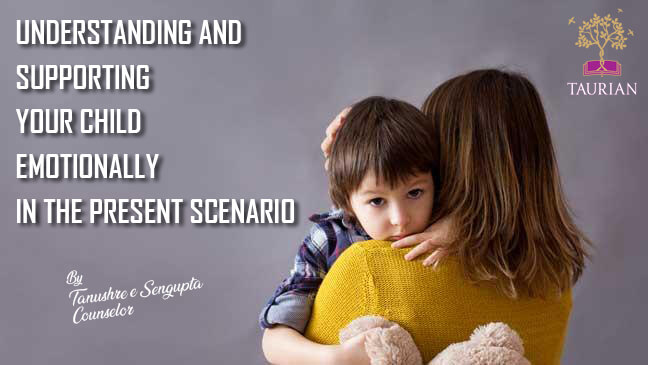Understanding and Supporting a Child Emotionally in the Present Scenario
April 29, 2020 2025-04-08 12:40Understanding and Supporting a Child Emotionally in the Present Scenario

Understanding and Supporting a Child Emotionally in the Present Scenario
Understanding a Childs’ Emotion
Stay Home and Stay Safe has been the clarion call and need of the hour. This social and physical distancing has led to a certain amount of emotional and psychological distress in both children and adults. Their way of life, every day routine, staying away from school and friends, ways of relaxation, outdoor activities – life has undergone a huge shift. This shift to e- learning and restricted contact with their friends and extended families is emotionally very challenging. Sometimes the child, especially a tween or a teenager may not be able to communicate their feelings . Younger children may express their emotions but cannot understand why they are feeling so. As parents we have to watch out for signs and be aware if our child is facing any emotional stress. I would like to discuss some visible signs and how we can address these situations positively.
1.Decrease in Communication:
Observe if your child is quieter, aloof or suddenly your frequency and content of conversation with your child has decreased. Be observant. To overcome this, pro-actively increase your conversation with your child in a casual manner. Try drawing their attention by opening up a conversation on a topic of their interest while going about your normal routine. Appear relaxed in your tone and body language. Take part in their interests and try to engage them in something mentally stimulating. Sometimes oppose their point of view, that will get them involved and help them practice their debating skills. Try to solve Sudoku / Puzzles with them, and most importantly allow them to lead you – sometimes losing is winning when it comes to children.
2. Signs of restlessness or feeling Anxious:
Hearing a lot of news about COVID-19 can make children feel anxious and restless. Restrict watching and listening to news. Do not completely mask them from the situation but pass the information through ways that are not overwhelming. Talk about the positive effects of the lock down like – reduction in pollution, rejuvenation of rivers, happy family time, oil prices going down, joy of wild life etc.
Take note, children need to sleep for 6 to 8 hours, and if the child is not able to sleep then it is a symptom that they are anxious, and hence parents need to re-orient and slow down children’s activities with soothing music and story reading. Less use of mobile before bedtime and a family board game or relaxing together is advised. Staying indoors can result in an increase in body heat, hence an evening walk in the balcony or garden or terrace may help everyone cool down and feel relaxed. Star gazing can also be an interesting activity and also help them feel calm.
3. Aggressive Behaviour:
Most parents have become busy with their house work and on-line official commitments. Absence of physical contact with children despite being at home along with their being forced to stay at home can trigger aggression and hyper-active behaviour. Children have tremendous energy and if it is not channelized in the right direction could result in aggression. So it is important for your family to have a child-centric and balanced routine. For younger children, healthy eating and playing routines should be supervised by a family member or a parent so that child is physically and mentally relaxed and gets the required attention even when the parents are busy with official or household work.
4. Social Media Usage:
Being stuck at home, screen time (TV and mobile) has increased for both children and adults. It has become the main source of entertainment and engagement. It is important to keep track and observe, silently, what the child is doing/watching. Please avoid indulging in peer-comparison (especially after hearing about other children’s progress in WhatsApp parent-group) as it may induce unhealthy competition in children and make them feel insecure. Make sure their peer-group do not bully them. Also keep a watch on their language and attitude especially after their online activities.
5. Handling Disappointments:
Generally, children plan different events and occasions in their mind and hence, disappointments are high at this time with cancelled plans and uncertain future. So they might take a lot of things to their heart. This is a time when we have to step in, intervene and help them handle disappointments in a more positive manner. Help them to make a list of things they can do, look for alternatives to the things that disappointed them. Make them realize that for every problem there are many solutions – give them examples from medical inventions, scientific developments etc. Empower them to find the alternatives with an open mind. Discuss about the difficulties faced by medical fraternity and researchers in relation to COVID-19, and debate with them and ask them to make a plan for your city/state/nation. You can teach them organizational skills through real life problems like how to organize food distribution in a city, how to select a spot for establishing new COVID-19 testing centers, etc. This will make them busy and bring out creative skills and management abilities, and will help them forget their own disappointments.
By,
Tanushree Sengupta
Counselor
Taurian World School



